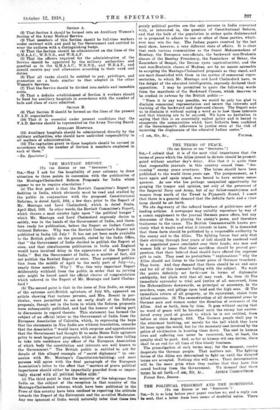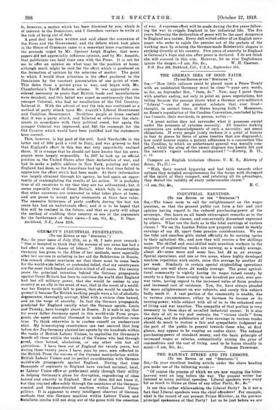THE POLITICAL PESSIMIST AND THE DOMINIONS. [To THE EDITOR OF
THE " SPECTATOR:] is so long before your paper reaches us, and a reply can be sent, that a letter from here seems of doubtful value. There
Is, however, a matter which has been discussed by you, which is sf interest to the Dominions, and I therefore venture to write at the risk of being out of date.
A good deal has been written and said about the connexion of the Press and the Government, and the debate which took place in the House of Commons came to a somewhat lame conclusion on the grounds urged by Mr. Spencer Leigh Hughes, that news- papers did not appreciably influence opinion, and by Mr. Asquith, that politicians can hold their own with the Press. It is not for me to offer an opinion on what may be the position at home, although much might be said for the effect which is produced on the formation of opinion by the selection of matter. The point to which I would draw attention is the effect produced in the Dominions by the constant presentation of one point of view. This dates from a period prior to war, and began with Mr. Chamberlain's Tariff Reform scheme. It was apparently con- sidered necessary to prove that British trade and manufactures were decadent, and this belief was urged so continuously that the younger Colonial, who had no recollection of the Old Country, Believed it. With the advent of war the tale was continued as a method of party attack upon Mr. Asquith's Liberal Government and Coalition Government. Doubtless people at home realized that it was a. party attack, and believed or otherwise the state- ments in accordance with their political creed, but again the younger Colonial was impressed, and felt the contempt for the Old Country which would have been justified had the statements been correct.
This, however, is bnt part of the evil. Lord Northcliffe in the latter end of 1916 paid a visit to Italy, and was grieved to find that England's effort in this war was very imperfectly realized there. It is strange that he should not have known that his news- papers were largely responsible. In 1917 he took up an official position in the "United States after their declaration of war, and had to make a public address in New York, pointing out what England had done, as the Amerilans had up to that time failed to appreciate the effort which had been made. As their information was largely obtained through his agency, he had again an oppor- tunity of contemplating the results of his action. It is probably true of all countries to say that they are too self-centred; but it seems especially true of Great Britain, which fails to recognize that other countries are interested in what takes place at home, and are prone to accept party statements at their face value. The excessive bitterness of party conflicts during the last ten years has had an unfortunate effect, and it is to be hoped that this will be realized in the future, and that no party will adopt the method of crabbing their country as one of the arguments for the furtherance of their views.—I am, Sir, Sc., S. GRAY. Auckland, N.Z., June 25th.



































 Previous page
Previous page